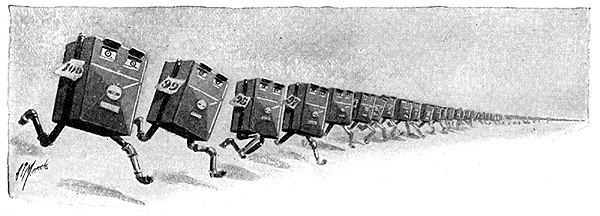
Better Days? Haw Haw Haw

The fact that the blessings are so mixed is a big reason it is so hard to feel blessed. Most of the plusses listed here are environmentally extravagant and inequitably distributed among the peoples of the world, which gives one pause before proclaiming our times the best times ever. More pause is provided by the grim specifics of decay. However relativist it may be, the civilization-in-decline scenario is awfully plausible.
- Befoulment of everything.
Urban air and rivers may have gotten cleaner in Western countries, but the air and water in many other places is getting much worse as developing nations industrialize, and once-pristine environments have degraded everywhere. (No doubt American wilderness will disappear at an even faster rate in the next four years.) Even if the West has cleaned up living spaces in big cities, the amount of really nasty waste, including nuclear waste, spread elsewhere remains enormous.
- Using up resources.
Worse than pollution is the wild consumption of irreplaceable resources -- especially knowing full well that they are irreplaceable and that we could take measures immediately to slow their depletion. Yet if you really try to take seriously this robbery of future generations, you risk either marginalizing yourself into environmental fanaticism or giving in to fatalist cynicism about the likelihood of meaningful change. The one-step-forward, two-steps-back approach to conservation that our decadent political economy supports seems too slow and too indifferent to the real problems to catch up to the rate of exhaustion. So even if patient support for environmental causes is the right thing to do, it is far from clear that it is really virtuous or will prove successful in the long run.
- World poverty.
It's really nasty and really unfair and associates guilt to just about every instance of improvement noted here.
- Decline of personal privacy and freedom.
Credit cards and video cameras and computers epitomize mixed blessings. They grant an ease of access to the world around us that was formerly unthinkable. But they expose us to the scrutiny of external entities, corporate or government, at a level far beyond the fears of just a generation ago. Or so it seems. The state of personal privacy is another one of those relative things where it's hard to know how much worse or better off we really are. There seems to be a degree of tolerance for deviance today that would make even the advanced thinkers of the past blush. Yet it also seems safe to assume that as authorities operate with greater and greater efficiency, the eclipse of privacy is indeed orders of magnitude worse than was conceivable a generation ago. The difference between personal data kept on cards in a hundred file cabinets and data easily exchangeable across a single network is vast. Most dangerous of all is that the greatest threats to privacy and freedom are the most comfortable, and therefore the most invisible. No one campaigns for a police state, they just offer more efficient online ordering, help finding your stolen car or safer airline flights.
- Public education.
Our tolerance for mediocre schools is horrifying, as are the politics that make their ineffectiveness so hard to reverse. I once was astounded, in my naive structural determinism, to hear the social critic Stanley Aronowitz argue that the collapse of urban school systems reflected an intentional policy of disinvestment. I couldn't believe that such a patent disaster -- one that diminishes everyone, not just its immediate victims -- could be a matter of policy. Now I'm certain Aronowitz was correct, even if all the consequences were not fully intended. Our society's willingness to tolerate, or facilitate, urban collapse continues to pose unbearable costs to this day.
- Decadence.
Americans are taught to view their history as a march of progress, with the occasional (if sometimes extended) hiccups of civil war, Jim Crow subjection or economic depression. But the advance of civilization is not even, or even inevitable. Nations, societies and civilizations are swept away and superseded with less than the sum of what had been. The narrow course of our own times show that in politics and culture, good is not inevitably followed by the better. Quality can vanish, enlightenment wither, benevolence fade. Backsliding not only is possible, it happens all the time, meaning that decadence is not a phenomenon peculiar to ancient Rome or Weimar Germany.

- The triumph of bureaucracy.
Max Weber was so right. We live in an iron cage where the rationalizing logic of bureaucracy, political and corporate, has triumphed. Those remnants of earlier cultures and traditional societies that aren't already disappeared are faded and trapped in enclaves that are themselves encased within the cage. And everywhere we see the fortuitous and the truly private evaporating. The moments of respite are sweet, but mostly delusional -- bits and pieces of culture cobbled together to provide simulacra of authenticity and autonomy. There really is no escape.
- Population.
Who knows what the earth's carrying capacity really is. We might be headed for catastrophe, or production of food and other necessities may keep up with the numbers. But even if everyone is fed, who needs the crowds? The physical environment would be pleasanter with fewer people, not more.
- God?
Well, lots of people have been wrestling with things spiritual for a long time. But it's no less annoying that so many fundamental issues remain uncertain. It's even more annoying that we seem to know less, not more, as the years pass.
- Mortality.
I need hardly say it's the ultimate bummer, and a pretty good reason for always believing the world is in decline: From the harshly bounded perspective of any given individual, it is.
So much for the top really awful things. If they aren't bad enough, they set a depressing stage for a host of smaller-scale annoyances that further undercut any smugness one might have over the course of human progress. Continue

Next
1| 2| 3 | 4
Back
The Latest Stuff | Roadside art | Outsider pages | The idea barn | About | Home
Privacy Policy
Copyright Interesting Ideas 2001

